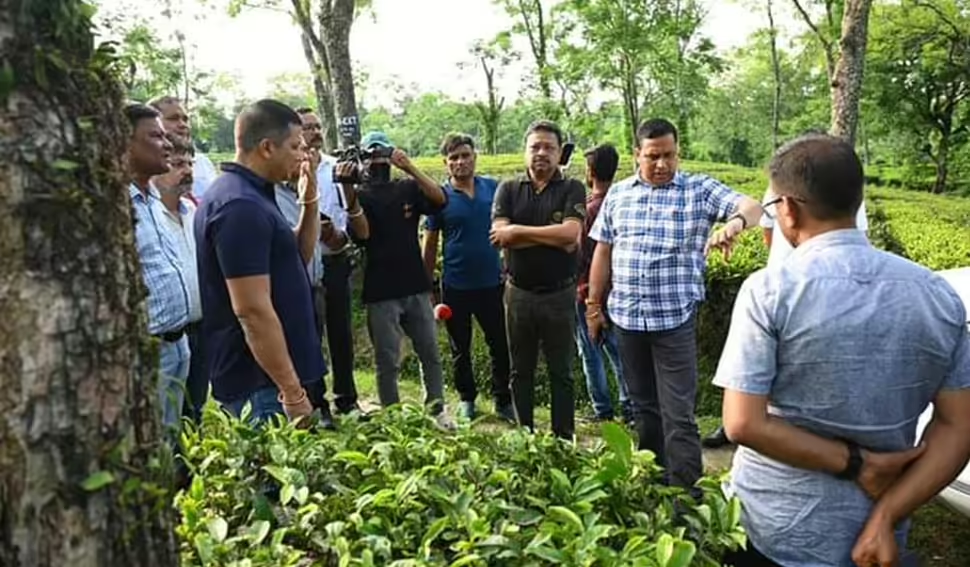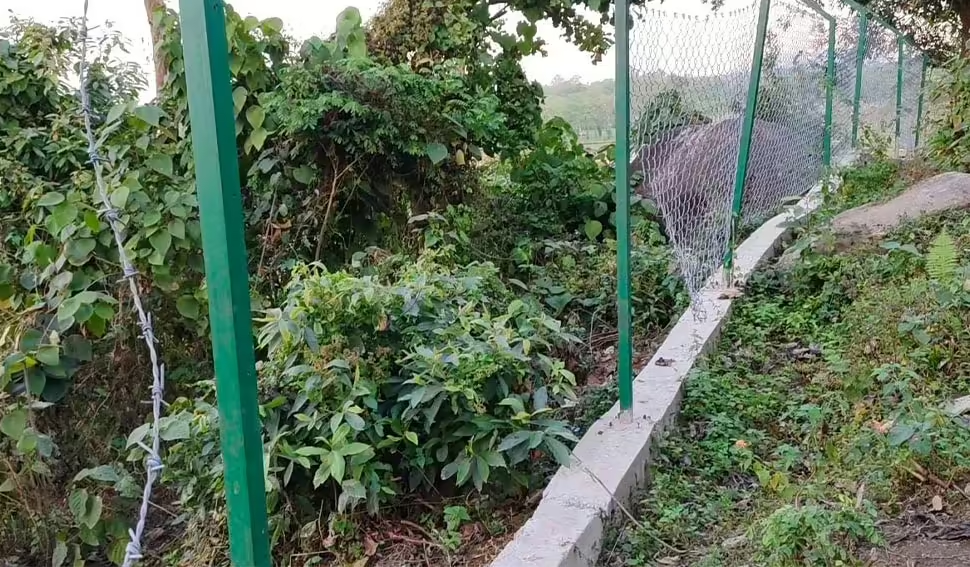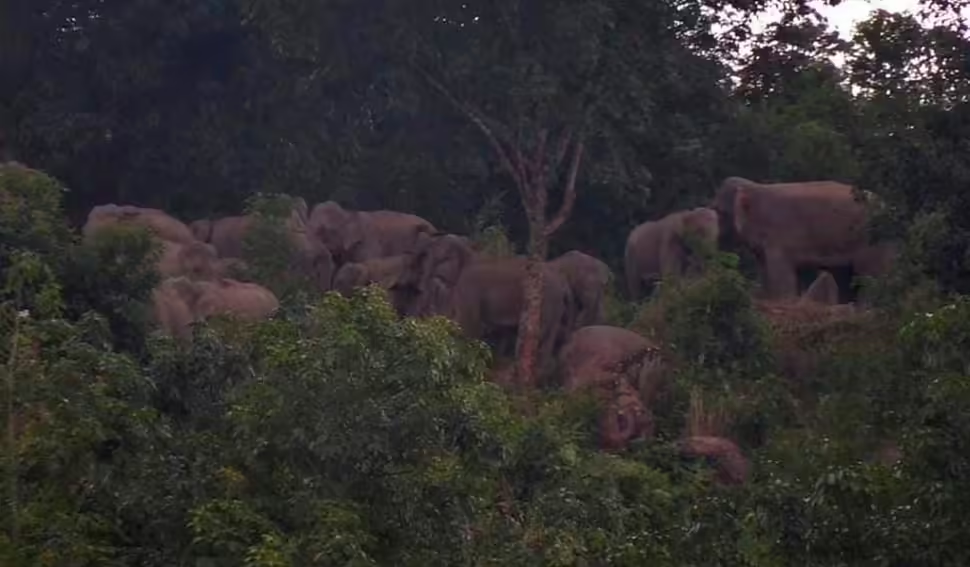Big hotels in Kaziranga may aggravate human-elephant conflict in nearby villages

Jeepal Krishak Shramik Sangha (JKSS), a farmers’ rights organization advocating for the rights of peasant and indigenous communities in Assam, on Friday said the setting up of two five-star hotels at an elephant habitat at Hatikhuli close to Kaziranga National Park and Tiger Reserve (KNPTR) will further intensify the human-elephant conflict in the region.
The Assam government has approved the proposal for setting up two 5-star hotels –Tata Group and Chicago-based Hyatt Hotel Corporation in Hatikhuli and close to Kaziranga in a bid to promote tourism in the state.
Tata Group will set up the hotel at its own land at Hatikhuli Tea Estate, while Hayat Group will set up the hotel on government land at Inglay Pothar (behind Hatikhuli Tea Estate) measuring 30 bighas which is under the possession of Assam Tourism Development Corporation (ATDC).
Jeepal Krishak Shramik Sangha chief Soneswar Narah Narah said Hathikuli Inglay Pothar is a traditional habitat for elephants and is considered as a ‘playground for elephants’ by locals.
Hatikhuli Inglay Pothar is located near the Kohora range at Kaziranga which is a UNESCO World Heritage Site.
The locals have been protesting not only the proposed hotel but also the construction of a Taj resort by the Tata Group.
“The areas in which the hotel and resort are to be constructed are places where the elephants seek shelter during the floods. The animals of Kaziranga seek higher ground to escape from the tumultuous waters, and it provides them an interim haven. Once the hotel and resort are constructed, where will the animals go,” Narah questioned.
Opposing the plan of the government, senior journalist and environment activist Apurba Ballav Goswami said: “It is an animal habitat. Not only elephants but even rhinos deer and other wild elephants also take shelter at this place during floods. So the plan for a big hotel at this place is condemnable.”
“Even as the Supreme Court asked the government to declare an eco-sensitive zone around 10 km radius of the National Park, the government is yet to declare ESZ in Kaziranga. If the ESZ is declared, the area will fall under the ESZ. So there is no question for allowing a big hotel in this area.”
In its first order on May 12, 2001, the apex court directed that an area of 10 km around the national park will be considered an eco-sensitive zone in case the state government fails to announce the ESZ to the date.
On June 4, 2022, the Supreme Court directed that every protected forest should have a 1 km eco-sensitive zone (ESZ) where no development project will be allowed.

A bench of Justices L Nageswara Rao, BR Gavai and Aniruddha Bose held that mining should not be allowed in wildlife sanctuaries and national parks and stressed that activities currently going on within ESZ limits can continue only with the permission of the chief conservator of forests of the state.
However, the Supreme Court, vide its Order dated April 26, 2023 modified its directions issued in the SC Order of 2022, inter-alia, to state that (i) the same would not be applicable to: (a) ESZs in respect of which a draft and final notification has been issued by the MoEF and in respect of which proposals have been received by the Ministry; (b) national parks and sanctuaries located on inter-state borders and/ or sharing common boundaries; (ii) mining within the national park and wildlife sanctuary and within an area of one kilometre from the boundary of the national park and wildlife sanctuary shall not be permissible; and (iii) directions requiring the permission of Principal Chief Conservator of Forests for carrying out permitted/ regulated activities in the ESZ shall be modified and replaced to state that: (a) MoEF shall strictly follow the provisions in the ESZ Guidelines and the respective ESZ notifications with regard to prohibited, regulated and permissible activities; and (b) while granting environmental and forest clearances to project activities in ESZ and other areas outside the Protected Areas, the Union of India as well as various State/ Union Territory Governments shall strictly follow the provisions contained in the Office Memorandum dated May 17, 2022, issued by MoEF.
In a letter to Assam Tourism director Kumar Padmapani, Expert Member of ICOMOS (International Cultural Tourism Committee), Sanjib Kumar Borkakoti said: “While two of the proposed five-star hotels are said to be by the Taj Group, it is reported that the Chicago-based Hyatt Hotel Corporation is setting up a five-star hotel at Hathikuli Inglay Pothar, which is a traditional habitat for elephants. Not only that, this area is considered a ‘playground for elephants’ by the native people of Kaziranga. There has been widespread apprehension that the proposed hotels would affect the Elephant Corridor. If that is the case, we would be constrained to take a serious note of the matter.”

“We therefore seek your clarification regarding the above and also whether the due environmental clearance was taken from all concerned bodies. Your reply will help allay our fears that the nature and characteristics of the World Heritage Site would not be compromised by the proposed construction and activities therein afterwards,” Borkakoti said.
“We welcome development, it should not be at the cost of nature. So, we would seek your certified assurance that the proposed activities would not harm the ecology of the World Heritage Site,” Borkakoti added.
Narah said: “You can compensate the farmers. But how can you compensate the elephants? It will further aggravate the situation and the people of the nearby areas have to bear the brunt of the situation.”
On June 14, the police and district administration of Golaghat district bulldozed fences under the pretext of a fake survey for setting up the 5-star hotel.
He also demanded accountability from registered NGOs, which have sworn to protect nature but operate with national and international funds without fulfilling their basic duties. “They roam in high places and distract the public by making them weave on looms, raise goats, and organise quiz competitions, just like the government forces do by giving out lollipops. This cannot continue,” he said.
He condemned the NGOs and forest departments that fail to protect the habitats of 300-400 elephants.

“Instead, he emphasized the injustice and eviction faced by the local residents, who maintain ecological balance by allowing elephants to graze in their fields. The government and nature organizations must bear the cost of this injustice and eviction,” he also said.
Jeepal Krishak Shramik Sangha declared that they do not want compensation but a solution, and they will lead a resistance movement with the slogan “We want a solution, not only relief.”
The organization questioned the compensation practices of WWF and the forest department, demanding rightful compensation for the local residents who lose livestock to wild animals.
The Jeepal Krishak Shramik Sangha warned that even the so-called nature organizations that fail to raise their voice for the protection of the land cultivated by 45 families and the grazing area of 300 elephants will have to face the consequences.
The KNPTR has nine animal corridors- Amguri, Bagori, Chirang, Deosur, Harmati, Hatidandi and Kanchanjuri are in Nagaon district and Haldibari and Panbari corridors are in Golaghat district.

The nine corridors that already exist behave as functional corridors, but according to the new recommendation, the corridors will act as both structural and functional, based on need.
Notably, NGOs working for wildlife conservation in Kaziranga have allegedly been silent on the government’s plan to construct hotels in and around the traditional habitat meant for elephants. The NGOs like Aranyak, Corbett Foundation and World Wildlife Fund Nature (WWF) have raised no voice over it.
“The plans will not only be ‘catastrophic’ for Kazrianga’s fragile eco-system comprising its elephants and other animals but also for its local people, who are mostly farmers who depend on the land for livelihood.”

Leave a Reply